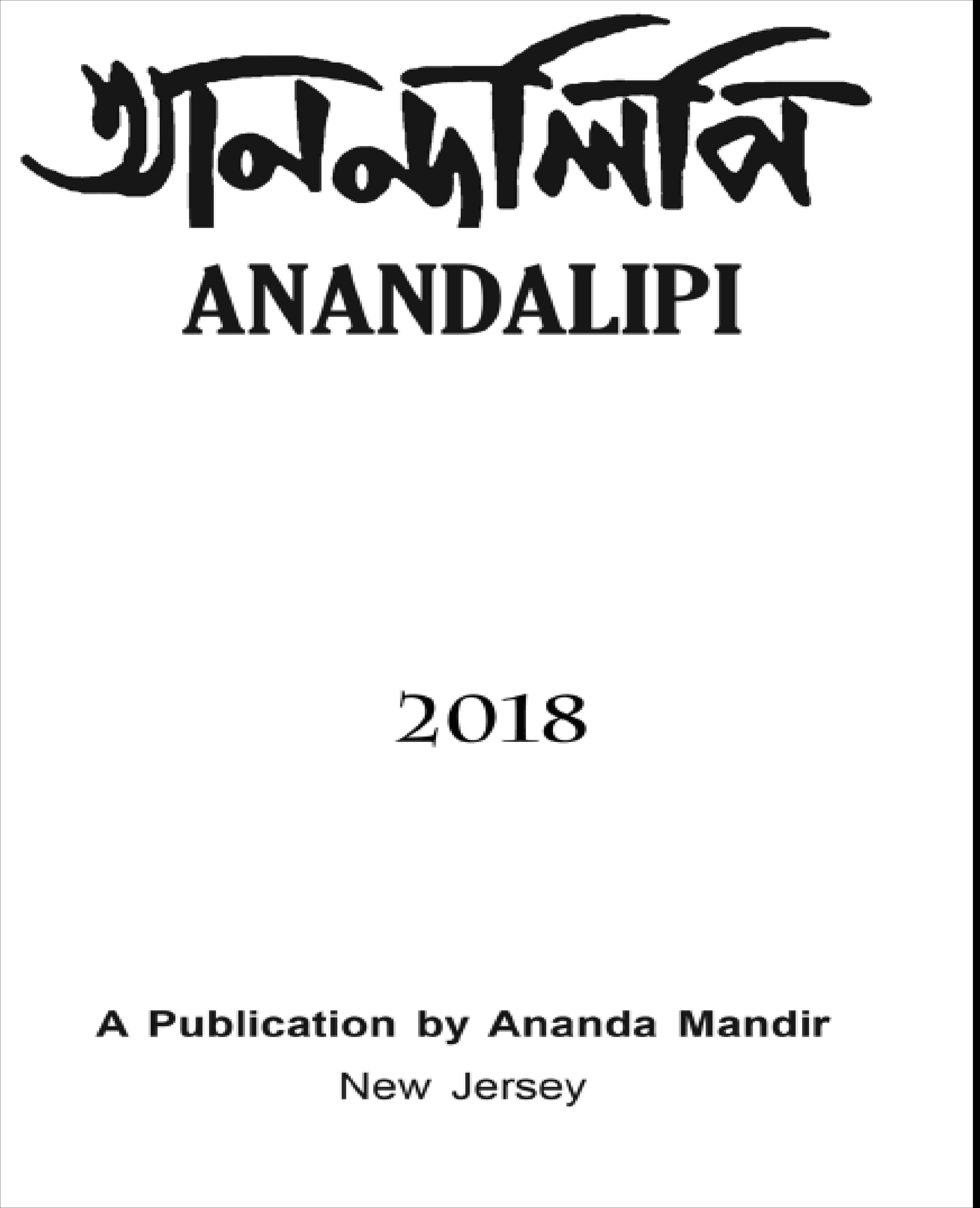AnandaMandir

Anandalipi
AMagazinePublishedAnnuallyby ANANDAMANDIR
ATax-Exempt,Non-ProfitOrganization
269CedarGroveLane;Somerset,NJ08873
Tel:732.873.9821
Website:www.anandamandir.org
PUBLICATIONSCOMMITTEE
Chairperson:
Debajyoti Chatterji, debsmee572@gmail.com
AssistantChairperson: Subrata Bhaumik, bhaumik.subrata@gmail.com
Editor-in-Chief,Anandalipi; Subhodev Das, subhodev.das@gmail.com
Editor-in-Chief,AnandaSangbad: Asok Baral, asokbaral@hotmail.com
Editors:
Pradip Das, prdas813@gmail.com
Tathagata Ghosh, tathagata_ghosh@hotmail.com
Sophia Mitra, sophiamit@yahoo.com
Rahul Ray, bapi@bu.edu
Advisor: Ashok Rakhit, ashokrakhit@gmail.com
Cover Design: Pradipta Mallick
About the cover:
Technical Assistant and Layout: Nirmalya Prachanda
Mahishasur Mardini by Nandalal Bose
Compose: Mohona Banerjee
Ananda Mandir’s
Board of Trustees and Committees (2024-2025)
Officers
(Members of the Executive Committee are identified with asterisks against their names)
President: Anjan Lahiri (*)
Vice Presidents: Debajyoti Chatterji (*), Ashok Rakhit (*) and Jai Prakash Biswas(*)
General Secretary: Arun Bhowmik (*)
Treasurer: Sanchoy Das (*)
Assistant Treasurer: Pradip Majumdar
Other BOT Members:
Jayadratha Bhowmick (*), Chanu Das, Subhrojit Dutta, Nimai Ghose, Saurav Ghosh, Sajal Mukherjee (*), Biswajyoti Nayak, Nilotpal Paul, Mitra Purkayastha, Anup Rakhit, Uma Roychowdhury, Dipak Sarkar, Shyamal
Sarkar, Rik Sen, Utpal Sengupta, Mita Sinha (*), Sankha Ghosh, Animesh Mozumder
Priest: Biswajyoti Nayak
Tagore Hall Manager: Kirit Dalal
Other Committees and Subcommittees
Award & Recognition
Ashok Rakhit (Co-Chair
Debajyoti Chatterji (Co-Chair)
Subrata Bhaumik
Susmita Biswas
Dipak Sarkar
Maintenance
Arun Bhowmik (Co-Chair)
Chanu Das(Co-Chair)
Prabir Biswas
Pradip Majumdar
Communication
Jayadratha Bhowmick (CoChair)
Nilotpal Paul (Co-Chair)
Community Relations
Utpal Sengupta (Co-Chair)
Animesh Mozumder
Constitution, Policies & Procedures
Dipak Sarkar (Chair)
Kamalesh Sirkar
Debajyoti Chatterji
Ashok Rakhit
Jai Prakash Biswas
Anjan Lahiri
Construction
Anjan Lahiri (Chair)
Jai Prakash Biswas (Asst Chair)
Ashok Rakhit
Animesh Mozumder
Saurav Ghosh
Sanchoy Das
Cultural Activities
Sajal Mukherjee (Chair)
Satyajit Bhattacharya
Arun Bhowmik
Suranjan Bhanja Choudhury
Mitra Purkayastha
Subhrojit Dutta
Priya Das
Anshuman Goswami
Major Events Coordination
Jai Prakash Biswas(Co-Chair)
Anjan Lahiri (Co-Chair)
Subhrojit Dutta(Asst Chair)
Chanu Das
Joy Bhowmick
Nilotpal Paul
Soumen Deb
Financial Analysis & Budget
Management
Jai Prakash Biswas(Co-Chair)
Anjan Lahiri (Co-Chair)
Chanu Das (Asst Chair)
Sanchoy Das
Pradip Majumdar
Audit Committee
Anjan Lahiri (Co-Chair)
Suman Banerjee(Co-Chair)
Sanchoy Das
Food Arrangement
Jai Prakash Biswas(Chair)
Ruby Sarkar (Asst Chair)
Uma Roychowdhuri (Asst Chair)
Suman Banerjee
Tapati Bandopadhyay
Suparna Biswas
Shom Chatterjee
Sanchoy Das
Nemai Ghosh
Pradip Majumdar
Debasish Mukherjee
Santosh Mukherjee
Anupom Saha
Ujjal Sanyal
Subhrojit Dutta
Soumen Deb
Swati Deb
Animesh Mozumder
Fund-Raising
Anjan Lahiri (Co-Chair)
Jai Prakash Biswas (Co-Chair)
Debajyoti Chatterji
Dipak Sarkar
Krishna Bhattacharya
Surya Dutta
Krishna Dutta Roy
Biswajyoti Nayak
Ashok Rakhit
Nilotpal Paul
Anjan Lahiri
Sankha Ghosh
Humanitarian Activities
Utpal Sengupta(Chair)
Animesh Mozumder
Literary Discussion
Subrata Bhaumik (Chair)
Membership Information
Jayadratha Bhowmick (Co-Chair)
Nilotpal Paul (Co-Chair)
Donation Collection
Bandana Rakhit (Chair)
Suparna Biswas (Asst Chair)
Kalyan Basu
Sikha Chatterjee
Purba Lahiri
Mitra Purkayastha
Anup Rakhit
Dipak Sen
Supriya Sen
Tandra Bhowmick
Subhechha Paul
Puja & Religious Services
Biswajyoti Nayak (Co-Chair)
Mita Sinha (Co-Chair)
Rik Sen (Asst-Chair)
Sharbani Mukherjee
Soma Rakhit
Ranjana Sanyal
Susmita Biswas
LopaDas
Soma Dutta
Rina Ganguli
Ambalika Mukherjee
Chhanda Aditya
Rita Bhowmik
Publication
Debajyoti Chatterji (Chair)
Subrata Bhaumik (Asst Chair)
Asok Baral
Subhodev Das
Tathagata Ghosh
Pradip Das
Sophia Mitra
Rahul Ray
Strategic Planning
Ashok Rakhit (Chair)
Joy Bhowmick
Jai Prakash Biswas
Debajyoti Chatterji
Anjan Lahiri
Sajal Mukherjee
Nilotpal Paul
Dipak Sarkar
Kamalesh Sirkar
Youth Activities — Kisholoy
Dipak Sarkar (Chair)
Youth Activities – New Programs
Sudipta Bhanja Choudhury (Chair)
Evergreen Club
Prabir Biswas (Chair)
Susmita Biswas (Asst Chair)
Debajyoti Chatterji
Sikha Chatterji
Writers Club
Debajyoti Chatterji (Chair)
Kitchen Maintenance & Food Safety
Sipra Bhol
Kirit Dalal (Co-Chair)
Uma Roychodhury
Ujjal Sanyal
Swati Deb (Co-Chair)
Soumen Deb
Tapati Bandopadhyay
OfficeAdminstration
SanchoyDas(Co-Chair)
Rama Haldar (Co-Chair)
Anup Rakhit
Kirit Dalal
Editorial
Dear Readers of Anandalipi
On behalf ofthe editorial board, I extend our heartiest Sharodiya greetings to you.
We are pleased to present Sharodiya Anandalipi, the flagship literary publication of AnandaMandir,availableinbothprintedandelectronicformats.Thiseditionfeatures adiverseandcaptivatingcollectionofessays,shortstories,poems,plays,andindividual experiences,writteninbothBengaliandEnglish.Someofthesepiecesprovidevaluable insights into global affairs from various perspectives.
Unfortunately, this edition does not include a Youth Section, which has been a part of previous years. Therefore, I strongly encourage parents and mentors to inspire the nextgenerationtocontribute. Wehopethatreadingthismagazinebringsyouasmuch joy as it brought us to compile it.
Ananda Mandir continues to serve as a guiding light for the Bengali immigrant communityinNorthAmerica,supportingreligiousandculturalendeavors.Ourtemple hosts both public and private religious ceremonies throughout the year, such as annaprashan(ricefeedingceremony)andmarriages.Culturalevents,includingmusic, drama,anddanceperformances,takeplaceattheTagoreHall. AnandaMandiroversees variousother publicationsandhostsregulargroup meetings, such astheWritersClub andSahityaOAlochana(LiteratureandDiscussion).TheEvergreenClubofAnandaMandir organizes engaging talks on important subjects like retirement, health, and leisure. Additionally,theclubofferschancesforseniorstoconnectwithothersandtakepartin diverse activities at Ananda Mandir.
I would like to conclude with a heartfelt remembrance of our dear Amitabha Bagchi, who dedicated many years to Anandalipi and was a consistent contributor to this magazine. We worked closely together on the editorial board, where he passionately pursuedhisvisionsregardingliterature,science,andhumanity. Wewillhonorhislegacy throughour future publications.
I wish you a safe and happy year ahead.
Subhodev Das Editor-in-Chief
Dr. Amitabha Bagchi (1945-2025)
Editor-in-Chief
Publications
President’s Message
Life is about pursuing what matters most. It starts with aiming for financial stability, followed by a desire for recognition. Ultimately, it leads to a deep longing to find a place where you truly belong. This reflects a modern interpretation of Maslow’s HierarchyofNeeds,adaptedforthedigitalage. AnandaMandirhasgenuinelybecome the heart of our community, fostering strong social connections and a real sense of belonging, especiallyduring these challenging times. We are truly grateful for this.
The temple hosts an impressive array of around 55 events annually, along with nearly 15 private pujas each month, all led by our dedicated Temple Priest, Bishwabhai. This incredible level of activity would not be possible without the involvement of our community, the hard work of our volunteers, and, of course, the generous financial support of our donors. Thanks to regular puja donations and the unwavering commitment of our supporters, we have managed to repay nearly half of the loans that funded the construction of the temple and the Tagore Hall complex.
We are excited to continue serving our community and look forward to building even strongerconnectionswitheveryonewhoparticipatesinthediverseactivitiesatAnanda Mandir. In addition to our Pujas, we offer a wide range of events, including cultural activities and literary clubs. You can find all the details on our website and in our publications.
Wesincerelyappreciateeveryone’songoingsupportandinvolvementinstrengthening Ananda Mandir. Thank you all for your continued engagement.
Anjan Lahiri President





















































































English Section
Prose
TheIsland,theHumanandtheHound
RabindranathandYeats
Satoko
TheGreekGod
TheMasterofRhythm
Victor-TheRenegade
TheReckoning Sin
TheLastBallad
TathagataGhosh 117
AsokBaral 124
BasabDasgupta 130
Vishnupriya 135
DebasishRoyChowdhury 139
MandiraChattapadhyay 143
RatnaKarmakar 147
RanjanChakraborty 150
Tapodiptaghosh153
Poem
LoveisEstranged
Vishnupriya 156
Odetonature
BakulBanerjee 157
OneHundredYearsofSoltitude
MitrajitMukherjee 159
RestYourWings
Vishnupriya160


























































































































Tothereaders,contributors,andpatronsof
Anandalipi andto Ananda Mandir
Your encouragement and support over the years have been key to our literary efforts!


















































































What Bengal thinks today



















Handicapped/Disabled Persons SpeciallyAbledPersons.
















Waitplease.







Waitplease GKTest















Where’sBangladesh?


Pisimonihasprovedthat BangladeshistheborderofPakistan. We











MANDIR
Sharbani & Sajal Mukherjee




















(contrast and comicrelief)

“TerrorsofTerai”





TO
ALL MEMBERSANDFRIENDS
OF
Ananda Mandir






















































































































Wishing
ANANDA MANDIR
a huge success as a center for Bengali culture and heritage!
A Friend












































ToAllMembersandFriends
AnandaMandir


























































































Ananda Mandir
Trustees & Volunteers
For another year of dedicated work!






































































































































































‘In France, Paul exclaimed, good cooking was regarded as a combinationofnationalsportand highart,andwinewasalwaysserved withlunchanddinner.’

Esmeralda Quasimodo


Notre-DameCathedral


boulangerie

Louvre





NotreDame Cathedral Cathedral ShakespeareAndCompany
37
ruedelaBûcherie,KilometerZero



Muséed’Orsay



Monet Water
Lilies “Anendlesswhole..”



VirginiaWoolf,MarkTwain, AnaisNin,JackKerouac




‘tumbleweed’



Shakespeare AndCompany


SylviaBeach


SanFrancisco CityLightsBookStore.




EzraPound, T.S.Eliot,Hemmingway JamesJoyce Beach
Ulysses

ShakespeareAndCompany.

George Whiteman. ShakespeareAnd Company

Shakespeare And Company


EifelTower



VirginiaWolf Bookscan perform,the‘astonishingacrobaticsofarising fromoneconsciousnessandreachinganother.’ Paris ShakespeareAndCompany
With Best Compliments From Kaushik Sengupta









DetailedInvestigation.




ExecutiveDirector



























































WE WISH A JOYOUS PUJA SEASON
ToAll Membersand Friends of
Ananda Mandir




Abhijit and Balaka Sen








whatisjojoni



ThamigonewithMummy






boysdon’tcry... it’soktocry it’soktobesad Sad it’soktobe sad... it’soktocry






To All Members and Friends of
Ananda Mandir

To Percy Bysshe Shelley
UddalokBharadwaj,Texas
Onewordistoooftenprofaned Formetoprofaneit,
Onefeelingtoofalselydisdained Fortheetodisdainit;
Onehopeistoolikedespair Forprudencetosmother, Andpityfromtheemoredear Thanthatfromanother.
Icangivenotwhatmencalllove, Butwiltthouacceptnot Theworshiptheheartliftsabove AndtheHeavensrejectnot,—
Thedesireofthemothforthestar, Ofthenightforthemorrow, Thedevotiontosomethingafar Fromthesphereofoursorrow?


“OdetotheWestWind”,“ToaSkylark”, “Adonais”,PrometheusUnbound,












Trelawny


JaneWilliams

EdmundEllerkerWilliams

Lord
Byron

MaryShelley


Livorno Leric


cemetery
Trelawny

Leigh Hunt


Viareggio

EdwardJohn
Viareggio

Tuberculosis calcification


protestant

Truthisstrongerthanfiction




















































































































Author’s note: “blank slate”. blank slate blankslate blank slate






































































































































The Island, the Human and the Hound
Tathagata Ghosh, New Jersey
ThemurkywatersintheGangesdelta andthedwindlingmistshroudedthe profileofalargeboatbeingnavigated by a weather-beaten man and an equally weather-beaten dog. The island they were heading to in the Sunderbans was one of the larger islands and as far as the man knew, completely uninhabited. The Sunderbanswasbeckoningthem.
The man had cut the engines of the motorboat as it bumped onto the mangrove roots and the pneumatophores,juttingoutfromthe island. The island was ringed by mangroveandthroughthestillofthe morning mist, the man could see just
a lonely jackal in the distance. There werebirdseverywherechirpingbutno other animal in sight. The man had hisdiggingandexcavatingequipment inside the boat. He also had a rudimentarymapoftheisland,thathe hadbeengiftedbyhislateuncle. The treasure that supposedly was on the islandgrewonhimlikeamythicspell till he could finance his trip here. He tookthelongroutetogetherefromthe sea.
The gharial crocodile bumped up against the large wooden thing that hasjustfloatedintohispartofthebay. Thecrocodileraiseditspointedsnout, calmly surveyed a two-legged
creature and a four-legged creature watchinghimwarilyfromthemassive log that seemed to be hollowed out. Not wanting to be bothered by this intrusion, he dove below the surface andslowlyswamawayflickinghistail a few times. He did not need any troublefromthesenewlandcreatures. Sometastycarpswamintohisvision, and he accelerated. Grridhar, the jackal,watchedfromadistancetrying to understand the barking of the houndwiththehuman.
Bina, the mynah, was sitting on the backofthecrocodile,feastingonsome mosquito larvae. Bina was preening, looking at her reflection in the water.
Binatossedherheadasshetookoffas the crocodile dove and made a twopoint landing straight on the head of theelephantqueen,thewiseandhotheaded,Ooma. Oomawassauntering back to her herd, which was chasing away the chital deer who started grazingon their area.
Binaclearedherthroat,chirping. Her yellow beak and yellow legs moved spasmodically before she started her tirade. Her orange crested breast shudderedasshespoke. Shewasalso nervous about the peregrine falcon thatwas hoveringhigh above.
‘Triktriktrik’shestartedbreathlessly.
‘Ahumananda hound has just come to our island in a cave!’ Bina, the mynah, said excitedly in the best elephant voice that she could. Bina, themynahbird,wasoneoftheofficial translatorsintheforest. Binawasalso known as a gossip monger hence Oomawasalittleskepticalofwhatshe
always breathlessly conveyed. Bina keptmuttering‘Trik,trik’shechirped nervouslyasshescouredtheforestfor thefalcon. Thefalconhadtakenaway oneofhersiblingsafewmonthsago.
Oomawaswaryofhumans,wholived on a distant bank almost a kilometer away,farawayfromtheirisland. The GangesRivercreatedthisislandmany years ago in the Sunderbans, in the centeroftheriverdeltaastheGanges spilt into the Bay of Bengal. The humans,whoweremainlyfisherfolk, onthefarbankoftheriver,sometimes went by in their boats close to their island but had never dared to come onshore. Theresidenttigerfamilyon theislandensuredthat. Theislandwas also resident to Graakha, the tigress and her partner and their little cubs. Thetigresswasrarelyseenbydayand huntedoftenearlyinthemorning,but herpresencewasalwaystangibleand fearful. The humans never dared to land on the island, paddling away in their rickety boats, as they nervously looked into the waters to see if one of theroyalBengaltigerswasswimming towardsthem.Itwasrumoredthathe tigress Grrakha had attacked a fisherman even though he was far awayfromtheisland.
Ooma remembered as a child, she livedonalandwithhumans,andthey werealwaysdestroyingtheforestand theirfood. Oneday,whenthehumans set the forest ablaze, trying to trap their herd, they ran and swam across the river. The humans even started attacking them with pointed sticks and fire sticks. Even the crocodiles madeway,whentheherdofelephants
floated and swam their way onto the island. Ooma was helped by her mother, who caught her by her trunk and helped her onto the island. This island has been peaceful as long as Oomacouldremember. Nowshewas grown-upandthequeenofthisisland, she intended to maintain the fragile peacethebestshecould.
Oomadidnotlikethetigerseitherbut there was a truce between the elephants and the tigers. The tigers rarely bothered the elephants. Provided the tigers could hunt the plentiful chital deer, they were content. Thetigerskepttheirdistance on the other side of the island, which wastheirterritory. Theyoccasionally huntedonthissideoftheislandtooif theywereextremelyhungry.Thatwas rare, as Ooma and her herd were territorialtooandchasedthemaway.
Ooma asked Bina ‘How many humans?’ she sounded exasperated and wondering what version of the truth she was going to get from the gossipgirl.
Bina said with certainty in her singsongvoice‘Justonehumananditalso hasahound. Averynoisyhoundbut I still don’t understand what it is saying’. It was only a matter of time before Bina would understand what thehoundwassaying.
Ooma snorted with annoyance, a furious trumpet call. That was an unmistakable call from the queen of the island and most of the animals in earshotflinched.Shewassurethatthe humanmusthaveheardhersincethey were not too far from the river. The
human would certainly perk up and sowouldthehound. Oomacouldhear thehoundbarkinginthedistance. Thentheyallheardaboom,almostlike thatofasnappingofalargebranchof atree. Theskyeruptedwiththefrantic frenzy of birds taking to the skies. A white-collared kingfisher dove by chattering,‘Thehumanhasalightning stick’. Even Bina was startled by the suddendisturbanceandflewoverthe man’scaveontherivertoassesswhat hadhappened.
A chital deer lay on the ground bleeding, as the hound jumped and barked around the deer in a frenzy. Most of the animals could smell the whiff of gunpowder in the air. Some of them could even smell the blood. The crocodiles, the gharial and muggers started swimming towards the island sensing the blood in the water.
Oomaletoutanotherbellowandsaid, ‘Iamgoingtobreakthathumancave. If I push it into the river, the human would have to leave the island with thehound’.
Grridhar,thejackal,whowaslurking around sneered at Ooma and said ‘If youbreaktheircave,howwillitbeable to float away? They will be stuck on our island forever. They stink of charredflesh.Everybodyhatesthat’.
Grridharhadseenthehumanlighting a fire and putting some chicken on it that the hound had hunted. The human had spoilt the taste of the chicken by burning the meat. The hound was the reason why the jackal washungrytoday.
Ooma commanded Bina ‘Go and ask the old pretender Gertie and ask him if he knows why any human would come to our island’. Gertie, the tortoise, was the oldest inhabitant on theisland.
Bina, the mynah, made a little pirouette and took off towards the general direction of Gertie the tortoise. Fromherheightandvantage point, she could see the human cave ontheriverandtheunfriendlyhound yappingawayontheedgeofthecave. There was a little fire on the ground. The smoke was seen from every part oftheisland.Everyanimalhatedthat smell, a poisonous odor that always portended one of the rare forest fires in the perpetually moist Sunderban island.
Carelesshuman!Binawisheditwould goawaybeforeitcausedanyharmby burning down the forest. She flew often to the bank far away from their islandandlistenedin,onthehumans there, and was beginning to mimic their language. The humans grew delicious food in the fields, and she always feasted on thegrains there till they started burning their dry fields onceeverythinghadturnedbrown.
Gertie, the old tortoise, was there underhisdesignatedkeoratreeonthe other side of the island, on tiger territory. His sour attitude reflected the keora fruit that he ate that fell on theground.Themonkeysonthekeora treeatethefruitsanddiscardedsome.
Gertie wasthememoryandhistorian of the forest, through his network of birdsandassortedspies.Heseemedto
knoweverythingthatwasgoingonin theforesteventhoughhecouldbarely move. He famously told his friends and enemies, ‘I hear every bloody whisperin the jungle. The closeryou aretotheground,themoreyouknow’. He fancied he was the Englishman whobroughtordertotheisland.Even whenherecededintohisshell,hewas listening. Every important vibration fromthegroundhadhis attention. Someofthebirdslaughedatpompous oldGertie. Theyoccasionallytriedto direct their bird droppings on him, bombinghiminflight. Slowashewas, he managed to elude most of them eventhoughheneverlookedskyward. Buttheyallcameandconfidedinhim when they had something to say, whichwasoften.
GertieclaimedhewasEnglishsincehe wasbroughtherebyanEnglisharmy officer who had abandoned him and left.TheBritishofficer,hismaster,left theislandrackedbyfeverandasnake bite many years ago when the keora tree was small and the tigers had not discoveredtheisland.
As expected, the parrot TokTok, Gertie’s friend and the chief resident spy, was sitting on Gertie hard shell, as if on a little imaginary throne. TokTok was warming herself on Gertieshardshelland makingamess withseedsaroundGertie. Toktokhad a magnificent hue of green with a brightredbeakwhichstoodoutinthe bleaknessoftheforest. Inbetweenher incessantmunching,TokTokwasalso filling him in with the forest gossip. TokTok had a unique understanding
ofthesignlanguageofmanyanimals, includingGertiethetortoise. TokTok claimed that she knew English because she grew up in an English householdinCalcutta.
TokTok flew up to the keora tree and saidconspiratoriallyto Bina.
‘Ohdear,ohdear.Gertiesaysthatthe human cave is called a boat that has come up from the sea. That bloody fool is not from the human village fromtheotherbank. Thishumanfool seems to beEnglish,andhis houndis alsoEnglish.Hecallshishound,King’.
TokTok told Bina, the mynah, that there never had been humans on this islandsinceGertieasayoungladhad come here with his English master. TokTok said that Gertie’s master was anEnglishman,anatureloverandan officer in the British army.
Ooma ordered the king cobra, Paambu, to carry out a termination. Paambu resided mainly on the branches of the trees and the holes in the ground. Ooma asked Bina, the mynah, to convey that to the King cobrathatheneededtoassassinatethe human.
Paambu, the cobra, was feasting on a ratsnakeneartheholeofatreewhere he lived when Bina came hovering around.Paambuwasnotinanymode to communicate till he finished his lunch. The tip of the rat snake’s tail thrashed wildly as Paambu slowly gorgedonit.
Bina still in her gossip girl mode, conveyed the kill order to Paambu in aseriesofchoreographedmoves.
‘Ooma, the jungle queen, has an assignment for you. You need to terminatethehumanwhoshouldnot beonourisland’.
The King cobra was still struggling withtheratsnakewithinhimanddid not respond immediately and slowly his majestic fan opened as he remonstratedtoBina.
‘WhyshouldIdoit? Ihaveneverseen ahumanbefore. IdonotknowifIcan killthehuman.’
Paambu slithered back onto the rock in disgust and pondered. He would needtotalkto Gertieanddecide.
He slithered over to Gertie the next afternoon, still engorged from the rat snake. PaambuaskedGertiethrough TokTok through a series of hooded headgestures ‘Oomahasaskedmeto killthehuman,whatshouldIdo?’
Gertie was a very peaceful soul and neverlikedtheviolenceontheisland. TokTok imitating Gertie’s head movementsopinedonhisbehalf ‘Justscarethehumanaway. Ifhesees youatadistance,hewillgetbackinto his floating house with the noisy hound and float right back into the river. If you attack him, he will come huntingforyouandkillyou.Humans are crazyand unpredictable’.
Early in the morning, Grridhar the jackal called out to Bina, the mynah, and Toktok, the parrot, ‘The human hasvanished.Thehumanhouseisstill there’. Paambu, the king cobra was relieved. He did not have to do anything. The human problem had resolveditself.
Just behind Grridhar was the hound barking in confusion. He looked lost andwastaggingalongwiththejackal who seemed to have accepted him as acompanion.
Bina and TokTok and expressed astonishment‘Howisitpossiblefora humantodisappear. Thejungletracks everything’. If only they had amity amongst all the animals, they would knowexactlywhathappened.
A distinct possibility was that the human had floated away on his log, scared away by the animals on the island but he would not have left the hound behind. The best they could hope for was that a predator had carriedthehumanawayandresolved theproblem.
Theworst-casescenariowouldbethat the human had disappeared and hidingsomewhereontheislandwhere Gertie’s and Ooma’s dominion and informationended.Thehumanwould remain aperpetual threat and maybe evenbecomeapredator.
The birds flew over the island, searching for the human. The hound was now communicating with Grridhar the jackal.
‘Find my master, find my master. Master lost, master lost’ he kept wailing. Grridhar understood that much.
Grridhar, the jackal, told him sternly ‘Ifyourmasterhasrunawaynow,you must live by yourself and depend on yourself. Iwillhelpyou,butyouneed to eat what I hunt. You should becomethewolfthatyouwerealways
destinedtobe.Proudandwildwithno master’.
The hound yelped and cried ‘I will findmymaster;Iwillfindmymaster’ heinsisted.
Dayspassed;thehumanwasnowhere tobefound. Notascentofthehuman. Everybody suspected Grraakha, the lioness, who must have come and taken away the human. Graakha did not communicate with anybody, but most animals would sense when she was near. It would be strange if she could have killedthe human without anyof theanimals being aware.
The hound continued to live in the boat where he had some security. Grridhar, the jackal, had started joininghimtogivehimcompanyand food. Thehoundhadstartedeatingthe foodthat thejackalwouldforageand soontheywerehuntingfowltogether.
Bina,complainingtoOomasaid, ‘Itmusthavebeen the crocodiles that killed and ate the human. We would neverknow’.
Ooma, laughed that away. ‘Not possible, there would be blood in the waterandtherewouldbescrapsofthe humanwashingbacktotheshore.All theanimals wouldthenbealerted.’
Thehoundhadnowalmostbecomea wolf, his plaintive cries became less frequent, and the animals began to understand him. He still cried often forhismaster,butGrridharthejackal would scold him and tell him to become like the wolf he was always supposedtobe.
Almost a month later, the rare buffy fish owl —, came hunting on their island. In themiddleofthenight,the owllandedonGertieshellandstarted talking to him. The owl’s large unblinkingeyes remainedwideopen even as she carried forth the news from the distant village on the other bank. His horns moved from side to sideashespoketoGertie.
‘The human is now in the faraway village. The falcon must have taken himbyforceinthemiddleofthenight. Isawthathewaspiningforhishound inthe village.’
Gertieaskedtheowl‘Doyouthinkthe villagers are goingto killhim?’
The owl screeched and flew away saying ‘I would not know what the villagers are thinking. Never trust humans but he seems to be well-fed’ headdedindisgust.
Grridhar,thejackal,toldthehound.
‘Your master is safe in a nearby village. The owl says he must have been carried away by a falcon. He misses you and has been crying for you’.
The hound barked and wheezed and finally Grridhar could interpret and understand.
‘No,no,no.Humanstookhim,humans took him. Humans stole him. Not falcon’.
This made sense now to Grridhar. Grridhar surmised that the humans fromthevillagemusthaveliftedaway theforeignerandtookhimbacktothe village when most of the animals were asleep. It must have been definitely against his will. Else his hound would have been taken with him.
Grridhar did not understand what stealing of a human meant but it seemed to besomethingthathumans didiftheydidnotlikeanotherhuman. Weretheygoingtokillthehuman? He didnotknow.
Thehoundfinallystartedforagingand eating and even putting on some muscle. His master would certainly return some day from the village wherehewascaptured.
He was determined to be healthy till then. He would not turn into a wolf. He would try to remain a dog till the time to reunite with his master. The call of the wild would need to be hidden.
Somedayhismasterwouldreturn.
Rabindranath and William Butler Yeats
Asok Baral, New Jersey
“… these prose translations from RabindranathTagorehavestirredmy bloodasnothinghasforyears…”,with these words, the Irish poet William Butler Yeats introduced the hitherto unknown Bengali poet to the English literaryworld.
YeatswrotethisinhisIntroductionof Rabindranath’s English translation of “Gitanjali”. Yeats first met Rabindranath at the London home of artist and art critic William Rothenstein on June 27, 1912. Rothenstein came to know Rabindranath on an earlier visit to Calcutta.Therehemadeafamousset ofportraitdrawingsof Rabindranath
andcommented“Idiscernedaninner charmaswellasgreatphysicalbeauty, which I tried to set down with my pencil”. On his return to London, Rothenstein established the India Society in collaboration with wellknown British and Indian people in the art world. The Society’s aim was to promote English people’s understandingoftheIndianpainting, sculptureandmusic.
Rabindranathfirstvisited Englandin 1878 as a student, when he attended lectures in University College of London. During his third trip to Britain by ship in 1912, he translated intoEnglishsomeofthepoemshehad
written in Gitanjali. In London, Rabindranath got in touch with Rothenstein and showed him the poems.Rothensteinwasoverwhelmed by the rhetorical simplicity and philosophicaldepthofthepoems,and he showed these to his good friend, William Butler Yeats. On reading the poems, Yeats burst into a torrent of praise: “If someone could say that he could improve this piece of writing, the person did not understand literature”.
On July 7, 1912, Rothenstein hosted a large gathering of friends and acquaintances in his home—, and invited Rabindranath as an honored guest. Besides Yeats, many leading
modernistpoetslikeEzraPound,and literary elites like Thomas Sturge MooreandErnstRhyswerealsothere. They were moved by the poems, and Rabindranath became an instant celebrity in the literary circle. And Yeats later referred to the London meetingas“oneofthegreatmoments of my artistic life”, and he described Rabindranath to Ezra Pound “as someonegreaterthananyofus”.
After the meeting, Yeats and Rabindranath worked on translating remainder of the poems and Yeats wanted to write the introduction of thebookofEnglishtranslation.Hewas somovedthathewrote“Ihavecarried the manuscript of these translations aboutwithmefordays,reading in the railway trains or on top of the omnibuses and in restaurants, and I have often had to close it lest some stranger see how much it movedme.”
Yeats also did some editing, though according to Rothenstein, he made only minor revisions but suggested which poems should be includedintheEnglishversion. Yeats also read the poems in several gatherings of the English literary circle, while Rabindranath had gone to Harvard to give a series of lectures which were widely acclaimed. On his return, the English Gitanjali, called “Song Offerings”waspublishedbythe India Society in November 1912. It contained translations
ofonly53poemsselectedfromthe157 poems of the Bengali version of Gitanjali, and translations of poems from Rabindranath’s 1912 drama Achalayatan (The Immovable), and other collections of his poetry from Gitimalya (WreathofSongs)and Kheya (The Ferry), for a total of 103 poems.
In the introduction, Yeats compared RabindranathwiththefamousBritish writers like Chaucer. He described Rabindranath as a wise and solemn mystic, and India as a land “immeasurably strange to us… and yet we are not moved because of its strangeness,butbecausewehavemet our own image, as though we have heard our voice... as in a dream”. Yeats’sIntroductionofthebookisthe most cited in academic treatises on IrelandandIndia’s culturalrelations.
The book was reprinted more than a dozen times within a year. Yeats continuedpresentingthebook,andhis biographerwrotethat“herelentlessly pressed [Rabindranath’s] case in the circles where he wielded Influence”, and Rabindranath was revered as a mysticmessengerfromtheeast,asthe readers found Eastern spiritual guidanceinhispoetry.
Despite all the adulation, as Ana Jelinkar pointed out, in the eyes of many, Rabindranath remained inferior as he was a member of the colonized society. Yeats continued with translating with more of Rabindranath’s works, and coauthored two books with Thomas Sturge Moore, who proposed Rabindranath’s name to the Nobel
Prize Committee for the award in Literature. The Committee, after its normal reviews, decided to give the award to the first non-white in the historyoftheNobelPrize.
However, in the Award Ceremony Speech on December 10, 1913, the Chairmanof the NobelCommitteeof Swedish Academy, Mr. Harold Hjarne,couldnothidetheEurocentric culturalsuperiority:“Tagorehasbeen hailedfromvariousquartersasanew andadmirablemasterofthatpoeticart which has been a never-failing concomitant of the expansion of British civilization ever since the days of Queen Elizabeth.” He, however, was profuse in praising Rabindranath’s literary works: “Seldom indeed in the realm of imaginative literature are attained so greatarangeanddiversityofnoteand of color, capable of expressing with equal harmony and grace the emotions of every mood from the longingofthesoulaftereternitytothe joyous merriment prompted by the innocent child at play”.
Rabindranath could not attend the ceremony,andhisspeech,readbyMr. Clive, the British Chargé d’Affaires, showed both humility and forthrightness:“IknowthatImustnot accept that praise as my individual share. It is the East in me which gave to the West. For is not the East the mother of spiritual Humanity and doesnottheWest,donotthechildren of the West amidst their games and plays when they get hurt, when they get famished and hungry, turn their face to that serene mother, the East?”
It is this “spiritual Humanity” that Rabindranath brought to Yeats, and Yeats found a “serene mother” in the offerings in Gitanjali. Yeats was already fascinated with the Indian religion andculture, andhis writings from the late 1800’s were permeated with Indian and Hindu spirituality. When he was only 24 years old, his threepoemswerefeaturedinthe1889 publication of Crossways – “The Indian to his Love”, “Anushuya and Vijaya”,and“TheIndianuponGod”. AshimDuttain“IndiainYeats’sEarly Imagination” notes the influence of theIndianplay Shankutala,writtenby Kalidas, on Yeats’s imagery of flora, faunaand landscape.Itis nosurprise that his meeting with Rabindranath created an upsurge of emotions, and he meant what he wrote in the Introduction that “These lyrics... display in their thoughts a world I have dreamed of all my life long… a tradition where poetry and religion arethesame thing...”
Yeats’s fascination with India goes back a few decades when he was introduced to the texts of Upanishads by his schoolmate and fellow poet GeorgeRussell,whohadgottenacopy through his spiritualist network. In his later years, Yeats was greatly influenced by three eminent personalities.BeforeRabindranath,it was Mohini Mohan Chatterjee, who taught him some Brahmanite tenets, especially Bhagavad Gita that emphasized karma and the reincarnation of soul. Calling Mohini Mohan a source of inspiration, Yeats wrote,“ayoungBrahmin….gaveour
vaguethoughtsashape”.Thenitwas Rabindranath and later in life, Yeats metShreePurohitSwami,withwhom he co-translated Upanishads and stressedtheuniversalapplicabilityof theteachings ofthesescriptures.
YeatswantedtobringRabindranath’s work to his home country of Ireland. In 1913, he organized in Dublin’s NationalAbbeyTheaterthestagingof drama “The Post Office” based on Rabindranath’s short story Dakghar. He had invited Rabindranath to visit Ireland, but the poet did not go. AccordingtoSirshenduMajumdar,it was“because[Tagore]haddistanced himselffrom thepoliticalscene ofhis own country, and did not want to get embroiled in any further controversies.Or hemighthavebeen advisedbyhismorecautiousEnglish friends that the English government would notbepleasedwithhisvisitto England’smostdisturbedcountry”.
Scholars have researched the relationship between Yeats and Rabindranath and found many similarities. Both were born at about the same time: Rabindranath in 1861, Yeats in 1865. Both were first to be awarded Nobel Prize from their respectivecountries–Rabindranathin 1913 and Yeats in 1923, both in literature. Both were citizens of British colonies, and both colonies were rife with factional fights along religiouslines–HindusandMuslims inIndiaandCatholicsandProtestants in Ireland.
But beyond these coincidences, they were similar in many ways – their
poetic instincts, religious mindset, pride in their ancient heritage, their uniquesenseofnationalism,andtheir resentments towards British colonialism. Because of these similarities, they instinctively developed a mutual admiration and found the embodiment of a common culture.Readersfindmysticisminthe works of both poets – not only a connection with God, but a total surrender,andasenseofgratitudefor the creation of the nature’s beauty all aroundus.
Yeats had often floated the idea of bringingdistantcivilizationstogether, and Gitanjali’s versesappealedtohim for its vision of universality and the spiritual tone that transcends the boundaries of India and applied equallywelltohisowncountry. When it came to Nationalism, both Yeats’s and Rabindranath’s visions were more of an internationalism that emphasized larger connectivity and opposed racial hatred. Their visions sometimeshadputthematoddswith the anti-colonial nationalists, but we find that over the years, Rabindranath’sactionsandsongshad been powerful catalysts in India’s freedommovement.
While Yeats’s admiration for Rabindranath was overt, Rabindranath affection for Yeats was moresubtle. HehadcomparedYeats’s workstotheVedicpoetsandsaidthat Yeats was “someone capable of comprehendingtheworldthroughthe un-trammeledpowerofhissoul”. He creditedYeats’sreturntothe“ancient poetictraditionsofIreland”. Butinhis
vast writings, there are hardly any mentions of Yeats, not even in Rabindranath’sautobiography. While inhis Autobiographies, Yeatsdescribes Rabindranath several times as one thathighlyinfluenced his life.
Interestingly, Yeats’s identity of European-ness or whiteness did not come in the way of his admiration of Rabindranath. But one notices a change in later years, when he admonished the religiosity in Rabindranath’s works - the same religiosity that he had championed sovociferouslyinearlieryears. Yeats, who had once described Rabindranath as “a great poet, if not the greatest poet of our time in the world”, wrote the oblique remarks: “HespeakstoomuchaboutGod”,and further clarified that “My mind resents the vagueness of such references... I have fed upon the philosophy of the Upanishads all my life, but there is an aspect of Tagore’s mysticismthatI dislike”. Their relationship became complex according to researchers, maybe because Yeats made the conclusion thatRabindranathwasnotexactlythe mysticthathe hadthoughthimtobe. Or,Yeatsmayhavebeeninfluencedby thewesternattitudethatsawIndiaas a land of spirituality, but with many ambiguities incompatible with the westernemphasisofpragmatism.For Yeats, Upanishads were as much a source of artistic inspiration as spiritualrevelation.
Yeats’s contradictory views about Rabindranathbecamemoreapparent
in the 1930’s. To celebrate Rabindranath’s 70th birthday, the “Golden Book of Tagore” was published in 1931, and in a letter to Rabindranath,Yeatswrote:“Iamstill yourmostloyalstudentandadmirer”, But only four years later in 1935, he wroteastrongcriticism:“Tagoredoes not know English, no Indian knows English”, and he went on so far as to claim responsibility for Rabindranath’s success. He commented: “We got out three good books,SturgeMooreandI”.
These comments may reflect Yeats’ Anglocentricsuperiorityinlateryears, calling his own work as “clear and rational”asopposedto“vaguenessin Tagore’spoetry”. Ortheattitudemay have been influenced by Rabindranath’s renunciation of the knighthood following the Amritsar massacre. In his letter to the King, Rabindranath had alluded to the Anglocentric view of racial superiority and defended his countrymen “who for their so-called insignificance, are liable to degradationnotfitforhumanbeings.”
Looking back at Yeats’s earlier oppositiontotheBritishcolonialismin Ireland,onewouldexpectanempathy from him, but one senses a strong Anglocentricbias.
Quite an about turn, and thus ended Yeats’ strong obsession with Rabindranath,andtherelationshipof two great poets of the twentieth century.
References:
•William Butler Yeats’s “Introduction”toGitanjali”
•NobelPrizeAwardCeremonySpeech byHaraldHjarne,Chairmanofthe NobelCommittee
•“The Nobel Prize Acceptance Speech”byRabindranathTagore
•Sirshendu Majumdar: Yeats and Tagore:AComparativeStudy(Irish ResearchSeries)
•Joseph Lennon: Writing Across Empire: W B Yeats and RabindranathTagore
•BaileyBatik:Yeats,W.B.,India,and RabindranathTagore
•Malcom Sen: Literature: Mythologisinga‘mystic’:W.B.Yeats onthepoetryofRabindranathTagore
•andothers
wonderful. Theyboughtatownhome. Theirfirstchild,ason,wasbornwithin a year. A daughter was born a year later. Anil’s regret was that Ruma remained a traditional Bengali woman. Her total dedication to their kids alsodidnotleave hermuchtime forAnil, butlifewasnotbad.
Anil’s Japanese bosses liked him because of his Indian origin and friendlypersonality. Suddenly,anew opportunitywasonthehorizon. Sony wanted to transfer him to Tokyo for three years to establish rapport with the Japanese engineers. Anil could then become an excellent liaison person between engineers in Japan and those in the USA. Anil was excited.
Ruma refused to accompany Anil to Japan forthatlong. Shelovedherjob andtheirtownhome;thekidsweretoo youngtobeproperlylookedafterina foreigncountry. Aftertheirusuallong arguments, they agreed that Anil wouldmakethemovefirstbyhimself. Ruma’s mother would be invited to staywithherandhelpwiththebabies. AnilwouldexploreTokyoforRuma’s professional opportunities. Ruma would try to get a leave of absence fromherjobfor ayearor two.
Coming to Japan was a second liberation for Anil; first from his motherandnowitwasfreedomfrom Ruma. No one knew him nor cared what he did. He had never dated American women, but now he was curious about Japanese women. He was fascinated by the soft feminine sides of Japanese women and their willingness to please their men. He
stayedawayfromsecretariesatwork becausehedidnotknowthecompany policyregardingsexualharassment. Hevisited“hostessbars”. Thesebars are frequented by Japanese businessmenafterwork.Scantilyclad women act as hostesses. Sex israrely involved but the girls give men company,pourtheirdrinks,lighttheir cigarettes, listen to their personal problemsandoccasionallydancewith them. Men spent hundreds of dollars just for this attention.
Anilwaslookingforwaystopasstime duringeveningsandweekends. Anad in a local English newspaper caught his attention: “Native Englishspeaking tutor needed to teach English”. Theword“native”implied a tutor whose native tongue was English. Anil felt that he qualified because of his education in English mediumschoolsinIndiaandgraduate studiesintheUSA. Hecalledandwas pleasantly surprised to hear a female voice atthe other end. Itwas Satoko.
He met Satoko for coffee near Harajukustation.Harajuku isasmall district of Tokyo. There is an ancient Buddhistshrineononesideofthetrain station and a tree lined street on the other side with cafes, pastry shops, restaurantsandsouvenirstores.
Satokowasayoungwoman,probably half his age. She looked more like a teenage girl than a woman. She was pretty, but it was her youthful glow and feminine mannerism that captivated Anil from the outset. She hadachildishinnocenceandcuriosity about everything; yet she was aware
ofhercharmandabilitytomesmerize men.
Shewassodifferentfromtheassertive American girls he used to lust after and so pleasant and quiet compared toRuma.ShespokeEnglishslowlyand discretely but seemed to understand Anil completely. She wanted to be morefluentinEnglishandgetajobas an interpreter either in a multinational company or government sectors dealing with international diplomacy. He readily agreed to Satoko’s terms and the routine of twice a week; tutoring started almost immediately. The tutoringsessionsweretobeconducted atSatoko’shome.
Satokosharedasmallapartmentwith another Japanese woman, Nori near Roppongi. Roppongi is an area of Tokyo, famous for bars, restaurants and nightclubs and frequented by westerners. Theintimatecozysetting in Satoko’s place for tutoring and its proximity to Roppongi were conducivetoromanticthoughts.
Anillovedtoexplainsubtledifferences between various English words by giving examples. Japanese language is a minimalistic language just like other aspects of the culture. The Japaneseextendthissimplisticstyleof communicationtoEnglish.“Nogood” can indicate a whole array of possibilities such as imperfect, unqualified, flawed, unacceptable, poor,deficient,needingimprovement, weakandsoon.
Oneday, hewasexplainingtoSatoko the differences between the words
love, like, lust, infatuation, crush, obsession etc. and at one point he lookeddirectlyintoSatoko’seyesand said, “for example, I like you, but I don’tloveyou”.Satoko’sresponsewas quick, brief and full of passion “but I love YOU”. Anil was stunned and couldnotspeakforseveralseconds;he kept staring at Satoko’s dark streamlinedeyes.Nootherwomaninhislife said those three words with so much emotion.
Anil was not an expert in seducing youngwomenbutfollowedhisnatural instincts.Noriwasnothome.Aniljust moved his face forward towards Satokosittingacrossasmalltableand gave her a quick kiss. Satoko reciprocatedbygivinghimawetkiss onhislips.Thiswasanewexperience for Anil. They held each other in a tight embrace. Satoko said in her brokenEnglish“Youaresosmartand sopatientwithme;youtreatmelikea realperson.Youtrytounderstandme. You can say things so clearly. The Japaneseguysjustwantto have sex”. Anil tried to retain his composure, “You know that I am married with kids,andfromadifferentculture.Iam toooldforyou.”Satokolookedathim with sultry eyes and continued, “WhenaJapanesewomanfallsinlove witha man nothing matters,whether the man is youngor old, rich or poor, married or single, tall or short, fat or thin,Japaneseorforeigner. Lovedoes notknowanyruleorboundary.” Thetutoringsessionssoonblossomed into dating sessions. Roppongi provided a perfect backdrop. They stayed there late into the evenings,
trying different restaurants, bars and dance clubs and just walking and mingling with the large international crowd that gathered there every evening.
Anil always felt self-conscious and awkward about dancing. Roppongi dance clubs were different. Here no oneknewhim. Onceinsideaclubthere was nothing else to do but dance. Clubs were crowded and pace was frenzied.Thewholeenvironmentwas surreal, and Anil could shed all his inhibitions just by looking at the adoring eyes of Satoko. He even enjoyed singing at the Karaoke bars with Satoko. On some occasions they went to see traditional Japanese Kabukitheaters.
Satoko introduced him to Japanese delicacies like “shabu shabu.” She tookhimonemorningtoTsukijiwhere they had breakfast with raw fish caught freshly right then and there. She showed him the right way to eat sushiwithchopsticksandtaughthim theproperetiquetteofpouringsake.
Anildidnothave toworktoo hardto move into an intimate status. It was Satokowhomadethemovestoseduce Anilwithheropenmouthkissingand caressing his body. The intense love makingsessionswereoutofthisworld for Anil. Yet, she was completely dedicatedtohimandathiscommand. It always seemed that her only purpose in life was to pleasure her man. Anil thought that his past eight yearsofmarriedlifewithRumawasa wasteofhisyouthfulyears.
Anil started to like everything about Satoko. Her voice and taste in art,
music, fashion. He always felt proud walking with such a young woman and showing off his virility. Satoko startedtospend alotof time atAnil’s apartment. They shopped together, cooked together, and traveled to nearbyplaces together. They made a day trip by Shinkansen (bullet train) to Kyoto, the city of temples. Best of all,Satoko’sEnglishwasimproving.
Satoko took him to a local coed Japanesebathhouse.Everyonehadto enterthebathnaked.However,itwas muchlessofaneroticexperiencethan whatAnilexpected.Therewereafew older women, and they did not pay any attention. Anil was happy to see the adventurous side of Satoko – so unlikeRuma.
Beingalogicalanddecisiveguy,Anil soon reached the conclusion that he would liketospendtherestofhislife withSatoko. Thethoughtofshowing offanexoticyoungwifetohiscollege friends,allstuckintherutof“Bengali” marriages,alsoboostedhisego.
He was visiting San Diego every few months keeping the charade of a happily married man to his friends and neighbors there. He could easily leadadoublelifefortwotothreeyears and keep Ruma at bay. Satoko knew he was married and did not mind. RumacouldevencometoTokyofora few weeks without posing any problem.
Thefutureplanningwasinfullswing in Anil’s head. Of course, he would havetodivorceRuma;hewasalready getting emotionally detached from her. It would only be a matter of
financialsettlement.Helovedhiskids butbelieved thathe could maintain a healthy relationship with them by being completely candid and explainingtheturnofeventsfromhis logicalpointofview.
Satoko could speak reasonably good English by now but remained very Japanese in her outlook, tastes, mannerismandcommunicationstyle. He wanted to make a couple of trips toUSAwithSatokobeforebringingup the“M”wordwithher. Thetrickwas howtoavoidRumaknowingaboutit.
In any event Anil started making a divorce plan. He estimated alimony andchildcarepayments.Somejointly held properties with Ruma, obtained through inheritances, would have to besoldtomakethesettlementsimpler. The best place for him and Satoko to live in San Diego would be the northern part of the city, close to the Sony facility because many Japanese familieslivedthere.
Hestartedtodreamabouthislifewith
Satoko. With Satoko being totally subservient to him, he knew that he wouldbefinallyabletotakecomplete control of his life without going into constant bickering. It would be satisfyingtomoldSatokointohisideal mate. Satoko might also bring him closertohisJapanesebosses.
Just when all of Anil’s fluid dreams werestartingtocrystallizeinhishead, Satoko stopped by his place one evening and declared in her usual simple and blunt style: “I am afraid I have to end our relationship.” There
wasnowarningnor anyeffortonher part to gradually prepare Anil. She continued without even waiting for hisresponse.“Ihavefalleninlovewith another older married man who is Japanese.”Anilwasstunned.Heknew that it was futile to persuade Satoko to change her mind. As she had alreadysaid,whenaJapanesewoman wasinlove therewasnologicandno rule.
Anilwasshockedbutnotdevastated. In fact, he was somewhat relieved by the turn of events because he did not havetomakeanydrasticdecision. He realizedthathewouldhavetolivethe rest of his life just by cherishing the memoryofhisincrediblerelationship withSatoko.
He came back to San Diego after completing assignment in Tokyo. Technically he remained married to Rumabutcouldnot continuesharing the bed and house with her. He felt emotionally completely detached from her and started living in a different home. He has been a good father and good provider to Ruma as wellashischildren.
Every so often he would establish a relationshipwithsomewoman–some lasting three months and some two years; none of them led to anything serious.Thethoughtofmarryingthem neverevencrossedhismind. Almost all of these women were Asians –Japanese, Chinese, Koreans. Deep down inside he is probably still lookingforSatokointhesewomen.
The Greek God
Vishnupriya, New Jersey
He stood there like a Greek god, irresistibly charming. Debbie visualized Adonis, tall, muscular, handsome. Itwasimpossible todismisshisattractiveness, or ignore it and walk past himintotheroomasheheld thedooropenforhertocome in. His tousled hair, windblownandabitmessy, looked terribly attractive. But he was indoors, so how didhemanagethismagnetic bohemianlook,unkemptbut not unclean? He was wearing a deodorant that smelled of the uniquely rugged Adirondacks. It could make anyone follow him like those drawn to the Pied Piper, smitten and bewitched. These deos and colognes easily made you swooninagoodway.
Debbie was embarrassed by her own stupidcrushandfollowedhiminside at a safe distance making sure he didn’theartheflutteringofherracing heart and the deep thuds that were burstingattheoddestofintervals. An ECG would have spilled the beans. The frisky butterflies in her stomach were hyperactive right now. She sat downonalargecozylushbluecouch andtriednottofocusonhernails.For themillionthtimeshewishedshehad done her acrylic extensions before
coming here. Right now, her nails looked pathetic. Also, a light root touch up would have been most helpful.Herhairwasagreymessnear the temple. Why did she have to feel so self-conscious? She helplessly hopedherdiscomfortwasinvisible.
He was single. He had lost his wife a few years back, he said, to mental illnessandchaos.Hehadalsobeenhis dad’s caregiver suffering from terminal ALS and who had passed. His memory was so fresh that Greekgod kept repeating his dad’s words without even realizing it. And nowhismom,whohadDementiaand
mobility issues, needed him like an infant. His other siblings didn’t trust their caregivingskillortemperament andvisitedonlyatThanksgivingand Christmas.
He said both his kids were still in school. The older one was college bound, this Fall actually, and the younger one, a sophomore, was belligerentandhardtoconvince,sohe leftthekidalone. Raisingthembeing a mom and dad at the same time was a big deal. Clearly, he had too much on his plate.
Butthathemanagedto beahunterin themidstofsomuchcaringforothers’ wellbeingwasbewildering.Slaindeer heads lined the walls of the living room, the family room, the basement and there were so many of them that itseemedtheywerealiveenoughand werefollowingherwiththeirsadeyes.
She also saw two rifles crisscrossing like crossbones on the wall and right next to them it said, “in emergencies, we don’t call 911.” Goodness gracious!! It was obvious. Human beings are complex bundles.Andthe godinfrontofherwasatoncecomplex andintriguing,acarerandkillerrolled intoone.
Heneededabreak,hesaid,frombeing home so much and caring for family. She saw he belonged to the wild in a big way. So, he looked trapped and tired,readytodropinsidethelimiting home space. She sensed a restless boredom with endless multitasking that needed addressing right away. Perhapshewaslookingtoincludethe wildonceagainin hislife:NewYork,
PA, Michigan, Wyoming, North Dakota,Alaska,TexasandAfrica.The call of the wild was alluring, the very idea was super charged with an indescribableadrenalinerush.
Hismomsittingrightacrossfromhim said she cared for life and kept repeating she hated the fact that he killedanimalsandcouldn’tfigureout howshehadbirthedakiller.
He shrugged and rolled his eyes and smiled from the corner of his lips because he knew his mom had been diagnosed with Dementia and was declining fast. It didn’t matter what she could and couldn’t figure out anymore. He seemed restless and ready for the wild and didn’t care what she thought about it at all.
He had to keep distracting himself with traveling. This was for self-care and sanity for himself and his kids. They all had been through lots. He was proud of the fact that his father tookprideinhimforbeingagoodson and that was enough. Everyone is different, even in the same family, he knewit,likehiskidswereandheand hismomwere.Youdon’treallygetto chooseyourgenesanyways.
“Bring me a Greek companion“, his momsaiddesperately,completelyout of the blue. “And a strong, healthy one,usefulandfunctionalwhospeaks Greek. I am tired of learning to speak goodEnglish”.
Greekgod and Debbie were totally shaken at the request. She squirmed on the couch, but he got up abruptly andwheeledhismomtoherbedroom while she continued to protest about
others’ cruelty creeping in the least expectedcornersofherexistence.
Danielawentonvoicinghowshewas now lookingfor peaceatthis age and time. Shewas93andhadseenallthat there was to be seen in an adopted country of alien practices from all parts of the world, a solid global mosaic, heterogeneous and confusinglydiverse.Shewaswaiting, sheconfirmed,foraneat,preplanned funeral. Herhusbandhadleftherher fair share despite his stormy affair with the absurdly young and super attractive Turkish waitress from Istanbulbeforehepassedaway.Thank God he had had the sense to be generous in spite of being rash otherwise withhis enchantress. Poor mancouldn’tresistDefne’sseductive power,likethatoftheSirens,Daniela reminisced matter of factly.
But it was time to forgive and forget andshewasnowreadytolierightnext to him in the adjacent burial plot to his.They’dboughttwospacessideby sideforthemselveswhentheTurkish waitress hadn’t been so important in theirfamilydynamics.Finally,nextto each other in the cemetery without anyintrusionfromoutsiders.
Daniela was also looking forward to an absolutely sentimental obituary from what was left of the family and lots of sniffling at the viewing, men and women in black or not dabbing their red noses with their white lace handkerchiefs. She smacked her lips savoring the aftertaste of her imagination.Danielahadalwayshad a vivid imagination, a gift that her
husband had been suspicious of for having the potential to blow everythingoutofproportion.Andher son took it with a copious handful of saltaswell.Buthemadenocomments about the Turkish woman. After all, everyonehasfreewillandtherightto choosetheirlives.
Daniela,however,thankedDebbiefor being such a good new neighbor and stopping by and more importantly bringinginherfavoriteDolmades. She still loved these familiar grape and cabbageleaveswrappedwithriceand all the rich meaty goodness stuffed inside. It reminded her of her childhood in Corfu and pure Love thatwas sorare thesedays.
Two weeks later Daniela was gone while she was dozing in her recliner. At first Greekgod thought she was snoozing and would open her eyes soonwhenhernappingwasdone;only she never did. Just like that! Poof… gone! Quietly exiting out of her body andascendingintoanotherrealmand goneforever. Nomess,nofuss,onlya smooth glide into a nothingness leaving her favorite recliner empty. Greekgod said he would let it be vacant forever as a reminder of missingthepresenceofsomeonewho wasmostlyabsentinhisplanofliving life fully, freely, unapologetically, unabashedly.
Debbie realised her crush on the Greekgod had lifted as quietly as the passingofDaniela.GreekgodAdonis would keep hunting now that his caring days were done. He was free to roam the wilderness and bring home more trophies. Debbie heaved
asighofreliefthatshewasfreeofher absurd crush of someone who had a hunting license by choice. Impulsive attraction and intrepid hunting are bothheadyandprimal. Butwhileone canbeinnocuous,theothersnuffsout life fatally. No judging, thought Debbie,onlywonderingthough.
Debbietookinthescentoftheincense wafting upfrom the censer while she stood looking at the black wooden casket inside the Church of St Anne with the most exquisite stained-glass windowsshe’deverseen.Danielalay inside the casket already transported farfromhersprawlingLawrenceville home to another kingdom beyond theirs. The voice of the priest trailed on, and the soloist poured her heart out in the hymns she sang with so much intensity. The Lord’s My Shepherd filled every corner of the church and many sang along. The funeral speeches were short and sentimental and everyone in black sniffled and wiped their eyes just as Daniela had wished for her final departure.
Greekgodandhiskidsandhissiblings were solemn but didn’t show the sorrow they were expected to feel. Theirgriefwasmellowandmeasured, noteffusiveandloud. They tookitin theirstrideandthankedeveryonefor beingthere. Eventhesuperattractive Turkish waitress once from Istanbul attendedthesolemnceremony inher short black skirt and tight black lace blouse. Shedabbedhereyesgingerly withthewhitefacetissue,makingsure the makeup didn’t run and blew her
rednosewhileeveryone staredatthe brevity of her skirt length and rolled theireyesindisbelief.
Debbie figured how over time the TurkishwaitressDefnehadbecomean important part of the family but now theywantedtoforgethercompletely.
The Family Diner in Lawrence Township, where she was such an integral presence once, had closed when Daniela’s husband Andreas became sick. Defne was now employedattheTurkishGrillinToms River. So,shewaseasilyforgottenand hardly missed when she left as soon astheserviceconcluded.Endingsare mostlybittersweetandrespectforthe deadisoftenaprotocol.Ormaybethis was the last show of respect on her part for the woman who had had her whole life turned upside down because of Defne and her old man engagedintheirownlittlewilddance togetherwhenhewasmanenough. Thiswastheendofsomanychapters. Whatremainedweretheremainsofa life gracing family photographs and thememoriesofthoseshelovedonce.
R.I.PDaniela!Mayyourpathonwards beblessedwithloveandlight! Debbie turned and walked back to her car in the parking lot with the echo of the Bibleverseinherheart: “Toeverythingthereisaseason,atime for every purpose under heaven:” (Ecclesiastes3:1NKJV)
Amen!
Everythinghasitstime,runsitscourse andeverythingpasses.
The Master of Rhythm
My reminiscences of Ustad Zakir Hussain
Debashis Roy Chowdhury, California
eyesandIbrakedhard.Attheopposite endoftheCirclestoodtheguesthouse and two men were coming out through its gate. I could recognize them in an instant, who would not! Pandit Ravi Shankar and a young ZakirHussainwereasdistinguishable as the sun and the full moon rising over the horizon. They probably had just arrived at the guest houseandwere takingastroll inthepicturesquecampusof IIT, Madras (it was not renamed to ‘Chennai’ then). It was in the early eightieswhenIwasdoing my graduate studies there.
Perhaps the sun sets more gently duringthefullmoon,asanindulgent nod to its reflected glory. The twin elephantsstandingback-to-backatthe ‘GajendraCircle’withtheirunnatural pink color, were like guards on duty, overseeing the change of scene about toplayout.
Iwaspedalingmysqueaky,oversized bicycle and was about to turn the corner when something caught my
Thatevening,withthe bright full moon hanging over the open-airauditorium, they performed together before thousands of students, faculty and staff of the Institute. I cannot recall what raags were presented on that occasion, but the atmosphere was nothingshortofagloriousmoonlight sonata!
This was the first time I heard them both in a live concert. And I hardly realizedthenthatwewerewitnessing twolegendsofmodernIndianclassical music: Pandit Ravi Shankar who had pioneered the introduction of Indian
classicalmusictotherestoftheworld andUstadZakirHussain whowould continue that legacy to make tabla a part of world music. They had been true ambassadors of Indian classical musicaroundtheworld.
During the mid-eighties, I moved to Chandigarh for my first job in the onlycommercial-scalesemiconductor foundry in the country, ‘Semiconductor Complex Limited’. From mychildhood till student days, I was fortunate to attend Indian classical music concerts in Calcutta, MadrasandBombay.Chandigarhwas like a backwater compared to these metros as far as classical music was concerned.
Afterresidingthereforalmostayear, when the first opportunity came to attend a Hindustani classical music concert, it was like a windfall. It was during the autumn of 1986, just around Diwali,inamodestauditorium inChandigarh.
The evening’s first program was a vocal recital by Vidushi Girija Devi accompanied by a young rising star, ZakirHussain.GirijaDevistartedher recitalwith raag ‘ShyamKalyan’.Her lifelong immersion in music became evidentfrom theeasewith whichshe caressed every note. As the khyal progressed at its leisurely pace, the young accompanist could not resist thetemptationofshowcasinghisflair on the tabla, so much so that at one point, Girija Devi had to chide him gently, “Beta, they have come to listen to me also!”
One could sense the impatience and restlessnessofayoungmaestrowhose virtuosity came in the way of his supportive role as anaccompanist. However, as Ustad Zakir Hussain maturedasanartistovertheyearsand established himself as the foremost tabla-player in the world, his selfcontrol while accompanying a main artist became exemplary. Here is an aptquotefromtheNewYorkTimes: “…herarelyseemsoverbearing,even when the blur of his fingers rival the beatofahummingbird’swings.”
Hindustani classical music demands acertainappreciationforthemoodof a ‘raag’ and restraint from a tablaaccompanist, especially say, when a vocalist is performing vilambit vistaar (slow exposition of a raag). In later years, one could observe, how perceptiveanaccompanisthebecame to remain subdued and support the mood of the vocal or instrumental music with rare precision and adaptation.
While writing this piece, I took time to listen to recordings of Zakir-ji’s accompaniments with several vocalists(availableinYouTube):
–Bhimsen-jisinging bhajans
–A shortclipofUstadRashid Khan presenting a tarana
–Pts. Rajan, Sajan Mishra and Pt.AjoyChakraborty presenting khyals
–VidushiManjushaPatil singing a natyasangeet
Whatever be the genre, Zakir-ji did
justiceas an accompanistas noother; he elevated the presentation to the nextlevelbyunderscoringtheprecise sentiment of the melody and the gayaki (style of presentation).
Needlesstosay,whenit cameto tabla solo, it was a different ballgame altogether: the world was his stage, andhetookitbystorm!
As his name and fame grew around the world, so did Ustad Zakir Hussain’s humility. Like the mithas (sweetness) of his tabla bols, his interactions with other musicians were always gentle and kind with a touch of childlike innocence. I had once witnesseditfirsthand.
It was a sarod recital by Ustad Ali Akbar Khan at MIT, Boston accompaniedbyUstadZakirHussain. Pt.BuddhadevDasguptawasvisiting Boston at that time. I was given the responsibility of taking him to the concert. We reached the venue early. Buddhadev-jiaskedmetogowithhim to the green room to pay respect to Khan-saab
As we were walking down the corridor,someonecalledBuddhadevjifrombehind.
It was Ustad Zakir Hussain. They exchanged ‘namaste’. Zakir-ji complainedwithasmile,
“Dada, you do not call me to accompanyyouthesedays!”
“Come on, Zakir-bhai! Where can I find you, you’re flying all over the world!”
“Dada,justemailmeandI’llbethere. Myemailis‘dha@....com’.”
It was a mere exchange of pleasantries. Yet there was genuine humility and show of respect in his words. It washishallmark.
The unparalleled creativity in tabla and rhythm by Ustad Zakir Hussain needsnomention. Iexperienceditin a unique setting at the Boston Symphony Hall in 2014. It was a World Music event, co-sponsored by LearnQuestAcademyofMusicasthe grand finale of its annual music festival. Theeventwasnamed,‘Zakir Hussain and Masters of Percussion’ featuring Niladri Kumar (sitar), Dilshad Khan (sarangi) with leading artists of kanjira, ghatam, dholki, dhol andwesterndrums.
Surrounded by friends and family, it was an evening of sheer musical magic! He played tabla like no one I had heard before – each stroke, each tapwasasifthe tabla wasspeakingto theaudience.Theclarity,thesoftness, the breath-taking speed and the unexpected twists-and-turns – it was likeamagiccarpetridewherehewas showing us one spectacle after another!Wewerespellbound.WhenI stepped out of the hall, the starry sky of Boston seemed a little closer that evening.IfeltasiftheGodofRhythm hadunwrappedaspecialmusicalgift justforme–itwasmyfinestbirthday presentever!
Thefollowingyear,WorldMusicand LearnQuest featured Pt. Shivkumar SharmawithUstad Zakir Hussain. It
wasatagrandauditoriumatHarvard University. Pandit-ji started his recital with raag ‘Gavati’. A few minutes into his presentation, there was a commotion at the entrance. A short, elderly person with a small crowdbehindhim,enteredthehallto take seat in the front row. Instantly, Pandit-ji stopped playing his santoor. Both the artists stood up with folded hands to seek blessing from the one andonly,M.Balamuralikrishna,who came to the concert after his own program at the LearnQuest music festival. Whatasightitwas–thethree grand masters of Indian classical musicrepresentingvocal,instrument and table, were paying standing ovation to each other.
Alas,noneofthemareheretoday! On December 15, 2024, the music world lostUstadZakirHussainwhenhewas barely 73! An artist like Ustad Zakir Hussainisborn fewand farbetween; the world may not witness such a maestro in decades or even in centuriestocome.
In an interview with BBC, Zakir-ji oncesaid:
“I am one of those musicians who came at the cusp of a great change in themusicworld,andIwascarriedon that wave …” He was too humble! Ustad Zakir Hussain created a new wave in tabla and rhythm in the world of music, whoseresonanceisheretostay.




We
Wish ANANDA MANDIR
Continued Success in the Future!
Shyamal & Ruby Sarkar
Victor : The Renegade, Traveling Poet
Mandira Chattopadhyay, Massachusetts
When the city life in Boston overwhelmedhimwiththehustleand bustleandwatchingpeoplededicating their lives to the pursuit of things of the material world, my friend Victor Pavlenkov, whom I met at a poetry reading session in Cambridge, dedicated himself to the world of poetry. Poetry seemed to be his
paradise, his respite. By birth a Russian, he settled in Cambridge for the last several years. He invited me and my family to his home. I soon discovered that he was a hermit. He told us that he, in fact, had been a political prisoner in Russia. “Does it scare you?” he asked, and we just nodded. He said that when he first came from Russia, he endedupinMiami.“Itwas too hot for me,” he said. EventuallyhefoundsnowcoveredCambridge,where hesettled.
Nicely built, he is tall with a head full of disheveled curly hair. He carries a tattered case around his waist with a small spade that he uses to cut occasional flowers from trees to present as gifts to hisfriends. Hewearsatall Russian black fur hat, further emphasizing his Viking-like stature. He notices my darting eyes peering at his spade and says, “It’s just a knife, and not a pistol.” I was relieved.
As he walks into Little CrepeCaféonOxfordStin Cambridge, MA where poetry reading takes place
on most Fridays, people would turn around and watch with awe at his stoic stature. He positions himself in the far corner of the room. When his turntorecitepoetrycomes,hedoesit from his heart without looking at the script. His voice is loud and strong with a distinct Russian accent.
Hetellsusthathehelpspeoplemove. Outsidehisdwelling,wenoticeahuge van which he calls his chariot. Many poems are pasted on the windows of the van, typed as well as written in pencil and pen. He smiles and states in his groveling voice, “Just think of my poetry as petals of flowers that decorate my chariot.” He also says, “The van you see there has been vandalizedmanytimes,andeachtime Irescueitbyplacinganadinthepaper stating,‘Ahandsomeawardwaitsfor anyonewhoreturnsmydarlingvan.’”
Hisroommateisa youngIndianman from whom he has learned a lot of Indian customs and philosophy. He loves nature – on chilly winter nights he goes through the woods. Wandering in the woods he collects twigs and feathers and makes quails outof the material. He writesnotices usingthesequails.
A graduate of MIT in Electrical Engineering, he donated his silverplatedgraduatediplomatoGoodwill, because he feels it is of no use to him anymore.
When we visited him in his rugged home, he kept pouring us cups of international tea alongside Russian biscuitsandmeatstenderedinbrandy. He told us how he had just returned
from a trip covering so many of the contiguous states, almost entirely by hitchhiking. Hestoppedpeoplehemet onhistriptoofferhimjustafewlines of poetry in the form of limericks. Peopleattimesthoughthewascrazy, buttheywouldturnaroundanddrop himafewlinesofpoetryanyway.
Beforestartinghisjourney,hetoldhis friendsthathewouldlike toembrace the world by hitchhiking, and this wouldbehisrenegadehappiness. His friendsgavehimasend-offpartyand askedhimtocomesafelybacktothem withwonderfultalesofadventure.As he prepared for his voyage like a Viking sailor, he said to himself, “Let me complete the journey that I have promised. Letthewindsofvoyage,fill mylungs,mywings,mysails!”
He explained to everyone along his travels of his position as a selfappointedpilgrimofpoetry. Hisfirst stop was Pittsburgh, PA. He wanted toseethepresidentofCarnegieMellon University, but he was stopped. Somehow,withalotofpersuasion,he managed to see the secretary of the president whoaskedhimwhetherhe hadscheduledanappointmenttosee the President. He then told her his mission, namely, to collect poetry written by the students. He was told that the best poetry written by the students was kept in university archives. He felt very disappointed, but still managed to approach studentsinthecafeteriaandhadthem share a few lines of poetry on their napkins. Manyhuggedhim,takenby his charisma.
HisnextstopwasAthens,Ohioatthe campus of Ohio University. He was glad to be on a small island of university culture. He did not go insidethecampusbutstoppedalively young girl and thanked her for her patience. Shehandedovertohimina sheet of paper that read:
“She sits, waiting for an answer And smoke curls around her finger, Noanswer
Bestofluckonyourtravel
Maytheloveofpoetry
Never leave myheart of yours”
“What a wonderful gesture!” He surmised.
Next, he went to Bethlehem, Pennsylvania. There he luckily fell upon a quaint building and found a groupofpeopledoingapoetryslam.
I told Victor, “I have experienced a poetry slam at Bucknell University, and that was a heavenly one.”
Heasked, “Didyou travelalot?”
“Yes, I did. I am now looking for a place to settle down,” that was my answer.
“Why not settle in Boston, where the Bahais,theHindus,andtheCatholics meet?” Heasked.
Istoppedhim.
“I enjoyed the Bahais. Right now, I reside in Arlington, where I want to meetthe localBahais soon.”
Victor said: “You seem to open your windows to listen to the story of others.”
“Yes,Ido,”wasmyreply,
Next,hetraveledtoCincinnati,Ohio, where he found a woman dragging a hose around her lawn for watering. She pointed to a sign: “Beware of dogs.”
Then, with an air of kindness, she stepped outside the lawn and asked himifhe was filming.
“No,no!I’mnotfilminganything! I’m just traveling around the world collectingpoetry.” Hereplied.
Thewomansaid,“YouhaveaRussian accent! Incidentally I’m Russian!”
Thenshehandedhimapieceofpaper that smelled of fresh oak and berries andread:
“Next to an Incredible wedding of ours, stands an ancient and small RussianCopticchurch”
He asked her, “Where’s your husband?”
She replied, “He just moved to the basement. Hewastiredofmesaying, ‘Russiatotheleft,Russiatotheright.’”
By now he felt so good. He had no commitments to keep. But he knew nobodycaredifhe waslostornot.
He kept traveling. He arrived in St. Louis,Missouri. Fromthecornerofhis eye,he sawapolice station. Therehe noticed an arrow pointing at the jail. He went up the stairs and met a policeman,whoaskedhimwhetherhe hadcommittedahomicideorwhether he wanted to surrender. He sang the
songofjoysayinggoodbye,tippedhis Russianhat, and left.
Next, he found himself in Tulsa, Oklahomainabookstore. Theowner said,“Thisisabookstore,peopledon’t come here to chat.” He understood thatpoetrywasnotwelcomehere. So, heleft,putouthisthumbtohitchhike and wentoffto the South.
Now,hehadfallenupon“ATouchof Texas.”At a gasstation,he stopped a young woman who was filling gas in her car. He started talking toher and soon found out that she had a degree in English literature. He instantly pickedupaquailfromhispocketand a bottle of ink and requested that she write a few lines of poetry, and she complied byscribbling a few lines on asheetofpaper. Afewhourslaterhe hiked and reached the town of Mohawk, but by then he was exhausted. Hewantedtocollectsome poetry but that was in vain. Maybe
he was not so enthusiastic and thereforenotengagingenough.
I remarked, “In one of our classes in AnthropologyweactedasMohawks.” “That’sinteresting,”hequipped. Now that he had traveled in the East andtheSouth,thenextstopwasdeep intheheartofBoise,Idaho. He could see the light of Boise beyond the next hill. Heturnedpoeticandwrote:
“A star flew by, but I hesitated to wish,andshewasgone.”
Victor returned from his travels several days later, his customary Russian black hatlittered with leaves and dust and all weird things considered. We met again for deliciousmeatsandteas,andheblew usawaywiththestoriesofhisnewest travels. Before we left his place, he handedme acollection ofpoems that I have used in this article.
The Reckoning
Ratna Karmakar, New Jersey
We have been waiting too long for a dayofcelebration.Weattendedmany of our friends’ children’s weddings andcontemplatedadayofcelebration for our son’s wedding. Ranjan is our onlyson.Peoplethinkheishandsome.
“No girlfriend yet,” a question naturally emerged in social gatherings. “Notyet,” wouldbemyshortreply.
Then we were impatient to the point that we would nudge him regularly. “You need to settle down. No one seems to be good enough for you!” I badgeredhim.Finally,myultimatum tohim.“Ifyoudonotfindanyone,we will put an ad in the newspaper and getyouagirlfromIndia.”“Mom,you cannotrushintoadecisionsointricate andvitalinmylife.Iwantamarriage to last, notrush into it. So, let me take my time to find the right person for me.”
Thefrustrationfinallyended.“Iamgoing to meet this girl. She is travelling to meet me. We have been talking for months. She is very pleasant and attractive.Youwouldlikeher,”hesaid.
“What is her educational qualification,”myhusbandquestioned.Heisa bigtimeacademicianandisintrigued byadegree.Ireallydonot care about adegreeanymore,havewitnessedtoo many academiciansturninginto miserable human beings. “She has an MBA from Columbia University, worksasafinancialanalyst.”Nomore
question,hewassatisfiedthatshemet histhreshold.
They started living together. After a couple of weeks Ranjan asked us to meether.Wetalkedoverthephonein between.Iaskedherwhatherfavorite food was. “Fish,” she answered. We thought we would go out for dinner atanicerestaurant.Evenso,Ibrought herhome-madefishcrocket.
After a lot of anticipation, we were ecstatic to meet a beautiful and pleasant young lady. “God is Great,” was my reaction. After an exceptionally long wait, the dawn of hopeemergedintoourlife.
For the next few days, we were only dreaming of the bonanza that would turn to fruition in our life. The upcomingcelebrationwaswellinthe planning in our dreams. I thought it was time to introduce us to her parents. So, I asked Nilam for her mother’stelephonenumber.“Oh,she is too busy at the hospital auntie. She will callyou later,” she said.
Christmas was approaching. Ranjan said they would spend the holidays withus.Wow!Perhapsweinvitetheir parentsaswell.Thesixofuswillhave thebesttimetogether. Itoldhim.
“Take it easy mom,” my son commented. “We’d meet them after youarecomfortablewithher.Youonly metherbriefly.”Thatsoundedlogical.
Weplannedforanextraordinarytime together.
Theywouldtakethetrainto gethere. Ranjan told us not to go to the train station to receive them. They would uber.
Wewere readyfrom earlymorning.I took shower, did a little puja, and arranged a nice breakfast ensemble. My husband, who rarely does any shopping, went out and got a nice flowerbouquettowelcomeher.After restless waiting, we opened the door beforethedoorbellrangandembraced Nilamin ourwarmesthearts.
After the exchanges of formal greetings, we sat down for breakfast. Nilam and I had tea, the men had coffee. Nilam just nibbled the food. I was shocked to see how little food a personcanconsume!
“My mom’s on the phone. She wants totalktoyou,”Nilamsaid.“MyGod, sheeatssolittle,”Iexclaimed.“Iknow. She is a poor eater. Perhaps you can fix her eating habits.”
I concocted varieties of fish and rice pilaf. Nothing else since I knew her appetite by now. Ranjan and Nilam wentout.Afterawhile,theyreturned withapackage.Thereweretwobooks in one of them. “The novel is for you, and the Math book is for uncle,” Nilam said.
“Youknow thatMathis hispassion,” Iquipped.“Suredo,”Nilamretorted.
Finishing the kitchen chore, I went downstairs and joined them in the family room. We watched a movie together. Nilam was comfortably
relaxed in Ranjan’s arms. We felt so happy and fulfilled to see them comfortableineachother’scompany. Atlunch,myhusbandservedwineto commemorate the day. I do not usually drink. But the day was extra special!
Nilam remarked, “Everything is deliciousauntie!”“Butyou didn’teat much!” My sort of accusatory response. “I will eat more at dinner,” she said. So, I did not bother to cook anythingelsefordinner.Therestofthe day passed quietly with some relaxation.
In the morning Ranjan said,” Nilam hasstomachvirus.”“Thefoodshould notcauseit.Everythingwasfreshand homemade.Anyway,letherrestfora while. When she feels better, we’d have breakfast.” That never happened. Every few minutes I checked on her surreptitiously. Then she vomited. At that point we were a bit concerned. “Nilam, drink some lemon water with salt and sugar so you do not get dehydrated. I will prepareit,”Itoldher.Aftersippingit, she threw up again. Now, I got alarmed. “Let me talk to your mom,” I said. “No aunty, please do not call her. She is in the emergency room. It happened to me before. I would be fine,”shesaid.
The entire day turned into a disaster. Nocooking.Shedidnot/couldnoteat anything. We ate leftover food just because we had to eat something. In themeantime,shecontinuedtothrow up. “I think you should go to the emergency room. This looks serious
enough to me.” “I will be fine aunty. Thisepisodehappenstomeeveryonce inawhile,”sheinsisted.“Iamcalling yourmom,”Isaid.“Pleasedonot.She would worry unnecessarily,” she insisted.Theanxiouswaitcontinued. In despair Ranjan commented, “She came to our house and got sick.” “That’s no body’s fault son. Unforeseenincidentshappen.Wewill dealwith ittothebestofourabilities. You take her to the emergency room to make sure nothing serious happens,” I said. He could not convince her to go to the emergency room, but the vomiting continued. Sinceshehadnofoodinherstomach, only mucus came out.” “I am not listeningtoyouanymore;Iamcalling 911. Let’s make sure you are okay,” I was firm. “I am telling you; it had happened to me afew times. I willbe fine after I rest.” “Then let me call yourmother,shemustknowthatyou aresick,”Iinsisted.“Shewillbeupset if you call her. She might come right now from Ohio. I do not want her to travelthisfarafteralongday’swork,” washerlogicalresponse.
Wewaited,hopingthatthingswould somehowturnforthebetter.Justthen Ranjan screamed. “Mom, she has blood in her mouth.” I immediately called9-1-1. ThenIcalledhermother.
“It’s alcohol withdrawal syndrome.” She said. The paramedics entered at thatmoment.“Wehave totakeherto
the emergency room. She is experiencing dehydration. “No, I would not go,” Nilam said. The paramedics said they could not take her to the hospital against her wish. I was on the phone with her mother. I toldhershecouldnotstayatourhouse inthiscondition.Hermotheraskedto give her the phone. Finally, she convinced her daughter to go to the hospital. Ranjan followed the ambulance in his car. She was admitted tothe emergencyroom and treatedimmediately.
“Sheisamess.”ThenursetoldRanjan. After a long night, a disheveled Ranjanreturnedhome.Christmasday was the most unceremonious day in ourlife intheUS.
Nextmorning,Nilam’smothercalled tosaytheywereontheirwayhere.We invited them to stay at our place, but they politely declined. Later in the nightNilam’sfathercametoourhouse to collect her stuff. In spite of this unfortunate incident, we had a very pleasant conversation. He was an amicablegentlemanwithpensiveeyes. When Ranjan went to pack her stuff in his room, he discovered a gallon bottle of vodka half empty. “You did notsmellitwhenshedrankallnight!” I accused him.“Vodka does not have any smell. So, alcoholics drink it to avoid detection, especially at a gathering,”mybrotherdeclared.
Sin
Ranjan Chakraborty, New Jersey
Samiran first saw Jogi, the madwoman,nearthealleywaybeside the neighborhood road. How she endedupthere,nobodyknew. Itwas aboutsixorsevenyearsago. Howold could she have been then, with her thin,darkframe? Maybetenoreleven. Someone had probably thrown a packetofleftoverfoodontheroadside, and she was scavenging from there. Samiranlearnedhername,Jogi,from Ratan,theownerof the smalltea stall intheneighborhood.Initially,hehad askedinsurprise,“Thatlittlegirl,and she’smad? WhonamedherYogiand why? What does she understand about Yoga?” Upon hearing this, the
rickshaw puller standing beside the shop,whosenamewasSibu,informed himthatitwasn’tYogiatall.Someone had named her Jagadamba, and she wascalledJogiforshort. Sibuhimself also had a proper name that he couldn’t recall any longer. He drove the rickshaw, bought for him by the Ghosh family, who lived in the twostory house nearby, and ate the food they gave him, sitting on their stairs. Perhaps because he had grown up eating their food since childhood, he wasnamedbythem,Sibu,acommon name in Bengali household. Perhaps his name was a more conventional Shibu but in the pronunciation of a
person uninitiated in a school, it became rather Sibu with a whistling soundoftheletters.
Jogiwasnotonlymentallychallenged but also somewhat mute. She would try tospeak ,butwouldget stuckat the first syllable. When she was hungry,shewouldholdoutherhand infrontofRatan’sshopandsay,“FooFoo-.”Perhapsshemeantfood. Ratan would sometimes throw her a cookie or a piece of bread. Often, the neighborhood boys would chase her and tease her. They would throw stonesfromtheroadbutwouldretreat when she would shout, “Fu-fu-.” Maybe she meant to curse and hit them, or perhaps, in that helpless moment,sheunknowinglycalledout to her father. Most of the time, she would stare into the distance with empty eyes, or sometimes just hum. Therewasnotunetoherhumming.
Onecouldsee herwanderingaround the neighborhood streets for a few days, and then she would disappear forseveralmoredays. Nobodyknew where she went. She would perhaps walk aimlessly, following the road to someotherplace.
Overthepastfewyears,Samiranhad noticed her growing up. Poor thing, she was growing older in age but not in mind. She didn’t care about her clothes. Shewouldsomehowmanage to wear torn saris that someone had given her. Someone must have dressedher. Samiran,sometimes,felt veryuncomfortableseeingthenatural development of a woman’s body in suchahelplessstate. Itwasn’talways covered. Whilecommuting,hewould
sometimes catch a glimpse of Sibu sitting on the rickshaw, waiting for passengers, and staring in the direction of Jogi. Samiran didn’t like thatlook. Buthedidn’tknowwhatto do. A thought, a worry, must have lingeredinhismind. Afterall,hehad been seeing Jogi since she was a very youngchild.
After a few more months, when the winterhadpassedanditstartedtoget a little warm, Samiran saw Jogi again on the neighborhood road from his window. Butwhathesaw madehim doubt his own eyes. In these few months, it seemed as if someone else had grown inside her. Jogi was pregnant! OhGod,whohaddonethis cruelty to her, he muttered within himself.
Beforethis,eventhoughSamiranhad seen Jogi many times, he had never spokentoher. Whomwouldhespeak to? Did she have any sense? Unable to sit still, Samiran hurriedly left his house. He had to do something. He saw Jogi near the road, as usual, searching for leftover food. As he approached, he felt a lump in his throat. She wasn’t the same and huffed at him in anger. Perhaps this changehadhappenedafterthecruelty inflicted upon her. Samiran was certainaboutthat. Takingafewsteps back, he shouted, “Who did this to you?” Jogi, as usual, could only manage to say, “Si-, Si-.” Samiran immediately remembered Sibu,sittingundertherickshawshade. Yes, it ought to be Sibu. Samiran’s blood boiled with rage. Without saying anything else, he rushed
towardsSibu. Heshouted,“Sibu—!”
By then, the other men in the neighborhood had gathered. Palash, the neighborhood guy ran and, grabbing Sibu who was sitting bent over beside the rickshaw, pulled him onto the road and started punching himmercilessly.Sibu shouted, “Why are you hitting me? What did I do?” But who was listening to him? Samiran said loudly from behind, “Haven’tdoneanything? Youarethe culprit, you rotten bastard. You deserve to be killed.” By then, Ratan hadjoinedtheothers.
Before anyone could understandanything, Jogi, who was standing a little distanceaway,started running towards the scuffle. She had picked up a broken glass bottle from the road. The bottle was glinting in the sunlight. Her eyes were filled with a murderous rage. She ran and with all her might, she thrust the broken glass bottle into Ratan’s stomach. Ratan fell to the ground, saying, “Oh God.” Blood gushed out, staining everything around him. Jogi’s clothes had shifted, revealing her partially naked body, but she seemed to be in another world. EveryonewasstunnedandleftSibuto trytounderstandwhathadhappened.
Jogi,panting, couldonlysay,“Si-,si-, si—sinner”. Some people started shouting,“Callthepolice,rightnow.”
Sibu, who had been freed, folded his handsandsaidinalowvoice,“Victory to God. Today, the enemy has been killed.”
The Last Ballad
Tapodipta Ghosh, New Jersey
The bar was almost empty, save for Alex and the bartender. Alex sat slumped over the counter, his calloused fingers wrapped around a glassofwhiskey. Thedimlightabove him flickered, casting uneven shadows over his unshaven face. His guitar case leaned against the stool beside him—an artifact of a career thathadcrumbledbeneaththeweight of a world that no longer cared for human-made art.
Sam,thebartender,waswipingglasses with deliberate precision. His presence was steady, his voice soothing—like the gentle hum of a favorite tune.
“Iusedtowritesongsthatmattered,” Alex said, breaking the silence. His voice was raw, a mix of anger and sorrow. “Songs that could make peoplecry,makethemfeelsomething. Now,it’s likeIdon’texist.”
Samplacedtheglassdownandleaned against the counter. “People are strange like that. Doesn’t mean your musicisn’tworthsomething.”
Alex laughed bitterly; the sound hollow. “Worth something? My last song made zero dollars. Meanwhile, “AI hits” stream billions. Perfectly crafted, soulless junk, butthat’s what they want. How do I compete with
perfection? How do I even matter anymore?”
Sam tilted his head, studying Alex with empathy. “Sometimes, it’s not aboutcompeting. It’saboutenduring. About creating because it’s who you are,notbecausesomeone’slistening.”
Alex stared at his drink, silent for a moment. Then, his voice cracked. “I’ve thought about ending it, Sam. Justdisappearing. What’sthepointif no one cares?”
Sam set down the towel and stepped closer, his tone soft but firm. “Don’t saythat. Theworldhasstillgotroom for a voice like yours. Even if it feels likeitdoesn’t,trustme—itdoes.”
Tears welledinAlex’s eyes.“Thanks, Sam. You don’t know how much I neededto hear that.”
He finished his drink, tossed a crumpled bill on the counter, and stumbledtowardthedoor.Outinthe parking lot, he fumbled for his keys butthen froze.
Hisguitar. He’dleftitinside. Turningback,Alexreenteredthebar, smilingfaintly. “Hey,Sam. Forgotmy guitar. Bytheway…Igottaask—are youarobot?”
Sampausedmid-wipe;hisexpression unreadable. Then he set the glass downdeliberately. “Yes.”
The word echoed in Alex’s mind, louderthanitshouldhave.Heblinked, confused. “What? No,you’rejoking.” Sam’sfaceremainedcalm. “I’mnot.”
Alexlookedaroundthebar. Theneon sign above the shelves flickered, and forasplitsecond,itglitched,revealing a grid of code beneath. The walls shimmered, like static on an old television.
“This… isn’t real, is it?” Alex whispered,hisvoicetrembling.
Sam’s tone remained gentle. “No, Alex. You’re in a simulation. A tailored metaverse. Designed to help youprocess.”
“Process?”Alex’sheadspun.“Process what?”
Sam hesitated, as if trying to find the rightwords. “Thatyourworldmoved onwithoutyou.”
TheweightofthewordscrushedAlex. His knees buckled, and he leaned against the counter for support. His guitar, still by the stool, began to dissolve into pixels, the strings disintegrating into lines of glowing code. The bar, the bottles, the counter—allof itbegan to fade.
“Wait!” Alex cried. “No! Stop!”
Butitwas too late. The bar vanished, leavingAlexinaninfinite,blackvoid. The only sound was a faint echo: a melodyherecognized.
It was his first song. The one he’d written when he still believed in himself. He closed his eyes and hummedalong,hisvoicetrembling.
Even here, in this endless void, the songwasstillhis.
For now, that would have to be enough.
Love is Estranged Vishnupriya,
Loveisanestrangedsentiment and it’s easy to hate now that the hint of an inflection, a non dominantregisterof “inconsequential”tongues afeebleaccentthatundressesyou orhowyou’dliketobeseenheard loved asequalsrespected can spark aslurwith sharp claws thatcuts throughlike adeep canyon andmakesyoutotterontheedgeof the precipice withgapinghurtand inclusion’sa joke asitgrowschokingdark but wethoughtwehaditfiguredright to walkinto the light oflookingat each other notasdemographicsspecsor numbers butmates ofthesoultribe damn!
New Jersey
whatever happenedtothemarches andvigils fromforeverandlongago thatpointedtothepromisedland inthe hereandnow? seems we have to wait forlove todefeat the dark chaos ’causeeven hate cravestobeloved inquietmomentsalone and that’s sonot unreal buthuman,right? so It’s time to draw theblinds andletthesunrisein.
Ode to the Nature
Bakul Banerjee, Illinois
Ode to the Albatross, Cape Horn, Patagonia
“I am the albatross that waits for you at the end of the world.” ~~ Sara Vial, Chilean poet
Ihadreadiedmyselftobehealed by new experiences, snatched by fistfuls from theair,shreddedby williwaw wind from the Strait of Magellan.
Under the grey collapsing sky, I had protected myself from the fierce wind by pressing mybackagainsta sturdyinner wall astheshipbeganroundingtheHorn.
Iclutchedaroughblanketover my warm clothes. Soon, the shimmeringsnow came down gently. My fellow travelers onthedeckhadabandonedme.
wrathhurledagainstthisinsignificant vessel.
Next came horizontal sheets of sparkling sleetto stingmyface.
In less than an hour, the grey sky dissolvedinto a luminous one, typical of the long summer of Patagonia, a magical curative potion.
Ilookedforsomesign,anysignabove.
An albatross soared high above me. Inspiredby itsstillness,Imorphedintoa fearless, tireless, and weightless fairy, joining him at this end of the world to float above the SouthernOcean.
Undaunted, I waited for more of Poseidon’s
AtThingvellir,Iceland
Onthisblessedland,shallwewalk onthenewearthborneverysecond by tectonic plates moving apart?
Shall we stand by the rows of high cliffs
snakingto the horizon as the scent ofsulfurseepsthroughthefissures?
Mysterious oceans hide the magma oozing fromtheviolentwomboftheearth,but here, whydidtheriftwishtorevealherself on land?
Shall we witness the flag flying proudly, marking the site of Althing, the Law Rock, where did elders rule ancient settler tribes?
Irememberholdingmyfather’shand, standing by the mighty river Brahmaputra, swelling.
I slip my palm into that of my adult firstborn, makinganotherpreciousmemory.
Watching ‘One Hundred Years of Solitude’ on Netflix
Mitrajit Mukherjee, New Jersey
Astring of labyrinthine stories
WovenintoanovelbyGabo*
OfUrsulaandArcadioBuendia
In a village called Macondo
When she slips softly next to me
I see her hair is slightly askew
The television screen is cool black.
The English subtitles are light blue
AgroupofgypsiesarrivedinMarch
Displayingtheirlatestinventions
Agreatuproarofpipesand kettledrums
StirringArcadioBuendía’s attention
The Netflix adaptation is gorgeous
The imagery is charmingly magical
A saga of the Buendia family
That is idyllic and enigmatical
Determinedtodecipherthegypsy’s secret
Withatelescopeandmagnifying glass
Arcadioholedupinanalchemist’s lab
Scarcelyseenbytheworkingclass
Each episode is languidly decadent
The magical realism quite ingenuous
Solitary individuals and inventors
Who’s lives turn increasingly tenuous
Macondobecameafledging community
Thewomenansweredtheirfamily’s call ColonelBuendiastartedcountless wars
But tragically lost them all
One generation passes away,
Another generation debuts
The secret of good old age is An honorable pact with solitude
*GabrielGarciaMarquezpennedthenovel ‘One Hundred Years of Solitude’. He was awarded the Nobel Prize in Literature in 1982.
Rest Your Wings
Vishnupriya, New Jersey
there’sbeensomuchfleeing that this wearingout is legit andthetired feathers need tobeplumpedforrespite it’s bestto restthewings inthestillnessofbeingbrieflylive buttheloadedgunssting andthewarjets goon andon
echoesofsobsinthedark notenoughtosurvive andsofewalive toburythoselostinthedesert and you can’t think clearor see straight what’s coming after noanthemsounds in honor of the fallen either youareontherunbeforeyourun outta luck andtheskycloses inairtight drownyourshadowyourechoyour pluck allyoudoislookupforlight
